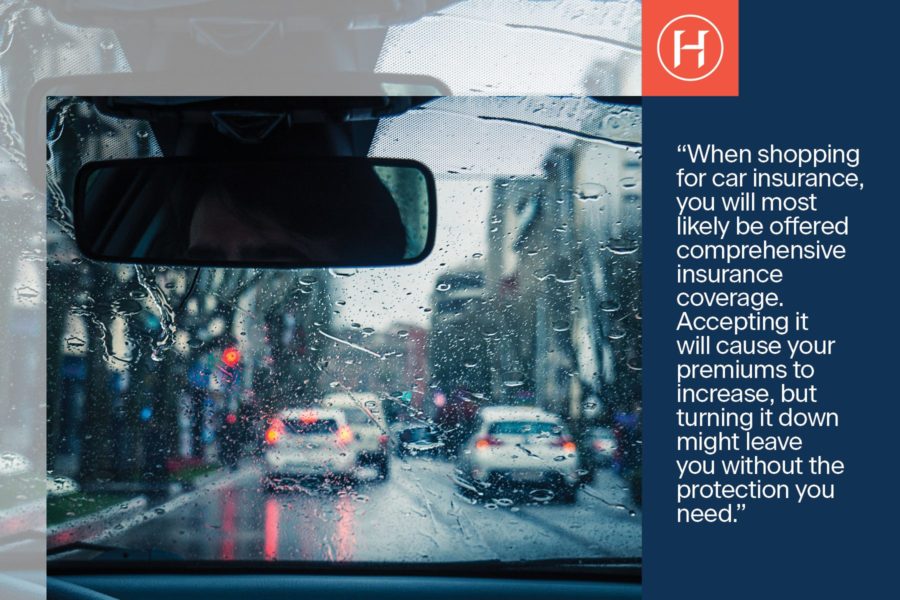When shopping for car insurance, you will most likely be offered comprehensive insurance coverage. Accepting it will cause your premiums to increase, but turning it down might leave you without the protection you need. So, what should you do?
The answer will depend on your situation. Before you decide whether to accept or reject comprehensive auto insurance coverage, take a moment to learn what it does.
What does comprehensive insurance cover?
Comprehensive car insurance provides property damage coverage for your vehicle. It does not cover damage from collisions. However, it does cover many other types of losses.
A typical comprehensive car insurance policy can provide coverage for many loss events, including:
- Hail damage, flood damage, and other types of weather-related damage
- Damage caused by animals or an impact with an animal
- Fire damage
- Damage from a fallen tree or other fallen object
- Theft and vandalism
- Broken windshield
What is not covered by comprehensive insurance?
Comprehensive car insurance covers many unexpected events, but it doesn’t cover everything. Comprehensive insurance is coverage for property damage to your vehicle. It does not cover:
- Bodily injury or medical bills
- The cost to repair damage that you cause to another person’s car or property in a crash
- Damages to your vehicle by excluded causes – often earthquakes, tornados, and other natural disasters (read your policy for restrictions and exclusions)
- Vehicle maintenance expenses
How much does comprehensive coverage cost?
Adding comprehensive coverage to your auto insurance policy will raise your rates. How much you’ll pay depends on many factors, including your driving history, your location, and the type of car you drive.
Another factor that can impact the premium is the deductible. If you file a claim, you will need to pay a deductible out-of-pocket. A small deductible might be around $500. A larger deductible might be $2,000 or more. Selecting a higher deductible generally results in a lower premium. This can make higher deductibles attractive, but it’s important to make sure you have the funds to cover the deductible in case you need to file a claim.
According to the Insurance Information Institute, the average cost for comprehensive insurance is $134 a year. That’s just over $11 a month.
What is comprehensive and collision insurance?
When you hear about comprehensive insurance, you often hear about comprehensive and collision insurance. These are two different coverage types, but they are often paired and offered together.
- Collision insurance is a type of property damage coverage that protects your vehicle if you get into a collision. For example, if your car is damaged in a crash with another car, collision insurance could pay for repairs to your car. Collision insurance can also pay for damage to your car caused by a collision with a pole, tree or other object. Crashes that do not involve other objects, such as if your car flips over or is damaged by a pothole, may also be covered through collision insurance.
- Comprehensive insurance does not cover damage from collisions, so it may make sense to have both types of insurance coverage.
Is comprehensive insurance required?
The legal requirements for car insurance vary from state to state, but comprehensive insurance is not typically required.
Most states require liability insurance for both property damage and bodily injury that you might cause to a third party. For example, if you are at fault in a crash, you will be responsible for the damages experienced by the driver you hit. Some states require additional coverage types, possibly including uninsured/underinsured motorist coverage and personal injury protection.
This doesn’t mean you don’t need comprehensive coverage. Even though state law doesn’t typically require comprehensive coverage, you may be contractually obligated to maintain coverage. If you have a car loan, your lender will most likely require comprehensive and collision coverage. You may need to list your lender on your policy with the insurance company.
Should I get comprehensive car insurance?
If you are still making payments on your car, you will probably be required to purchase comprehensive coverage. If you have paid for your car in full, you will need to decide whether comprehensive coverage is a good investment. In many cases, it is. However, if you have a very old car that is not worth much, you might decide against coverage.
Before you decide, consider a worst-case scenario. Imagine your car is stolen, totaled in a crash, or destroyed in fire or flood. How would the loss of your vehicle impact your life? Would you be able to get to work? What about driving your family around or running errands? If you depend on your car, as many people do, think about whether you could afford to purchase a new car. If you couldn’t, you should seriously consider purchasing comprehensive insurance.
What other auto insurance types do I need?
Collision and comprehensive insurance are two types of auto insurance coverage. Depending on your state laws, lender requirements, and personal situation, you may need additional coverage types.
Here are some of the other most common auto insurance coverage types to consider:
- Bodily Injury Liability Insurance: This is liability insurance in case you injure a third party in a crash. Most states require bodily injury liability coverage.
- Property Damage Liability Insurance: This is liability insurance in case you cause property damage to a third party. Most states require property damage liability coverage.
- Personal Injury Protection: This insurance covers medical bills and lost wages if you or your passengers are injured. Some states require personal injury protection.
- Uninsured and Underinsured Motorist Coverage: These two insurance types cover your costs if you are hit by a motorist with no insurance coverage or by a motorist with insufficient insurance coverage. Some states require or strongly recommend uninsured and underinsured motorist coverage.
- Gap Insurance: This insurance covers the difference between the value of your car and the amount you owe if your car is totaled. Because cars depreciate quickly, this coverage can make sense if you have a new car that you owe a lot of money on.
Do you have the right car insurance?
Car insurance cannot be applied retroactively. To make sure you have the insurance coverage you need, you must purchase it before a claim occurs.
If you need help determining which coverage types are right for you, contact one of our brokers for assistance.





